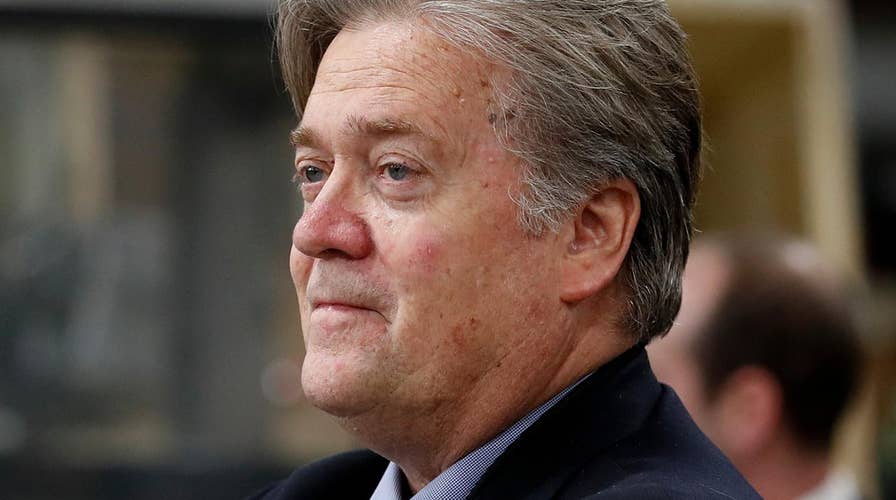Will Bannon remain a 'loyal soldier' to President Trump?
President Trump parts ways with his chief strategist; insight from Anna Palmer, senior Washington correspondent for Politco
A stand-off with China over the country’s shady tactics for obtaining U.S. tech is at the center of speculation over whether Steve Bannon’s nationalist trade agenda will survive in the Trump administration even after his resignation.
Late last week, just as Bannon’s exit as was announced, U.S. Trade Representative Robert Lighthizer announced his office took the rare step of launching an investigation of China under what’s known as Section 301 of the Trade Act of 1974.
“I have determined that these critical issues merit a thorough investigation,” Lighthizer said in a statement, citing concerns about whether Chinese policies are harming American intellectual property rights and innovation.
The obscure trade tiff has led to a great divide on this side of the Pacific.
The concern from corporate America, unions and free trade experts is that the Trump administration will follow its bluster with potentially damaging unilateral action. The concern from the so-called Bannon base, however, is that the administration will pay lip service to the fiery populist’s agenda, only to back down in the end.
While little-known and not used in years, Section 301 was a big deal for Bannon, Trump’s chief strategist for months. In his infamous pre-departure phone call to the liberal American Prospect, Bannon talked trade shop at length and cited the Section 301 complaint.
Bannon said his internal adversaries on trade were “wetting themselves” and predicted the complaint would be revived despite being shelved amid tensions with North Korea.
“To me, the economic war with China is everything,” Bannon told the reporter. “And we have to be maniacally focused on that. If we continue to lose it, we’re five years away, I think, ten years at the most, of hitting an inflection point from which we’ll never be able to recover.”
Section 301, which enables the U.S. to unilaterally investigate trade complaints and if need be retaliate, has rarely been used since the Reagan administration, which was battling Japanese imports of popular, low-cost cars and trying to get Tokyo to open its markets to the Big Three.
But that was before the World Trade Organization’s founding in 1995. Since then, Presidents Bill Clinton, George W. Bush and Barack Obama preferred to tangle with trade partners through the protective umbrella of that global trade system.
It turned out the China challenge was revived even sooner than Bannon thought. After President Trump issued a memo Aug. 14 instructing Lighthizer to consider launching a Section 301 probe, the trade rep followed through on Aug. 18 – the same day Bannon’s departure was made public.
While Trump’s announcement days later on his Afghanistan strategy has angered some Bannon-ites for the president’s tilt into more foreign intervention, the prospect of a trade fight reflects the Bannon spirit still -- to the chagrin of free-trade advocates like Dan Ikenson.
“It’s consistent with Trump’s bombastic approach,” said Ikenson, who focuses on U.S.-China trade as director of the libertarian Cato Institute’s Center for Trade Policy Studies. He added, “It’s just fireworks, more bark than bite. Unless the U.S. imposes sanctions, it’s par for the course.”
Ikenson pointed out that Lighthizer and Bannon are on the same page when it comes to China, so it’s not surprising that aspect of the Bannon agenda lives on. The primary focus of the investigation involves so-called forced technology transfers, where China coerces U.S. companies into divulging sensitive technological secrets in exchange for access to Chinese markets.
“The Chinese are heavily dependent on us for semiconductor tech and the tech for military operations,” Ikenson said. “China has decided they have to steal the technology, coerce it and condition trade with us on obtaining our technology.”
It’s a major security issue, he acknowledged. The free trader believes China needs to be stopped but would prefer it be done through the WTO, rather than unilaterally, because he worries other nations might go their own way, too, and destroy the young global trading system.
“If we bail out of the WTO, or undermine it, all bets are off and it could be a free for all,” he said.
But Ikenson doesn’t think it will come to that. “I think Lighthizer is smart enough not to kill the WTO,” he said. “I think Bannon would like to kill the WTO. But Lighthizer will not take it to the level” of unilateral, retaliatory sanctions against China.
Joel Farkas, director of the right-leaning American Strategy Group, called the administration’s China complaint “valid.”
“Trade agreements should not be titled ‘free trade’ when parties can violate provisions without repercussions,” he said.
In an interview with the Weekly Standard, Bannon seemed to cast doubt on whether his ideals would be reflected in the administration going forward.
“The Trump presidency that we fought for, and won, is over,” he said.
Fox News’ Amy Leedecke contributed to this report.












































